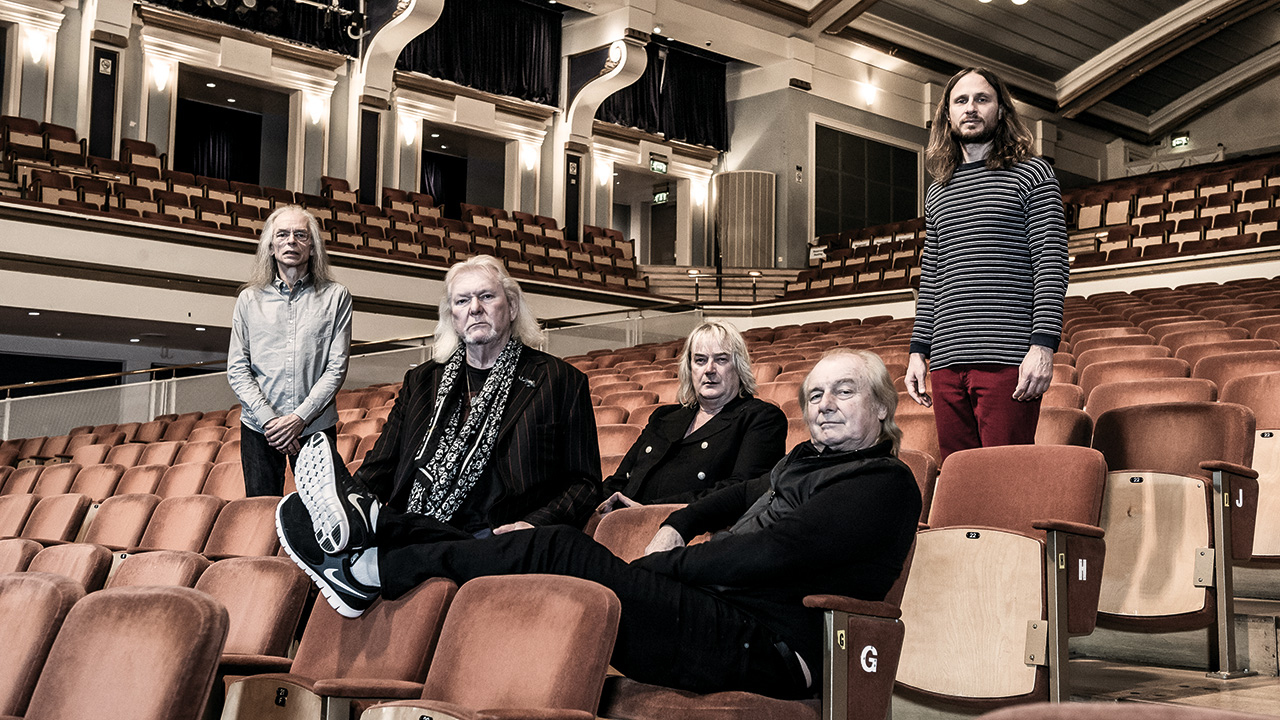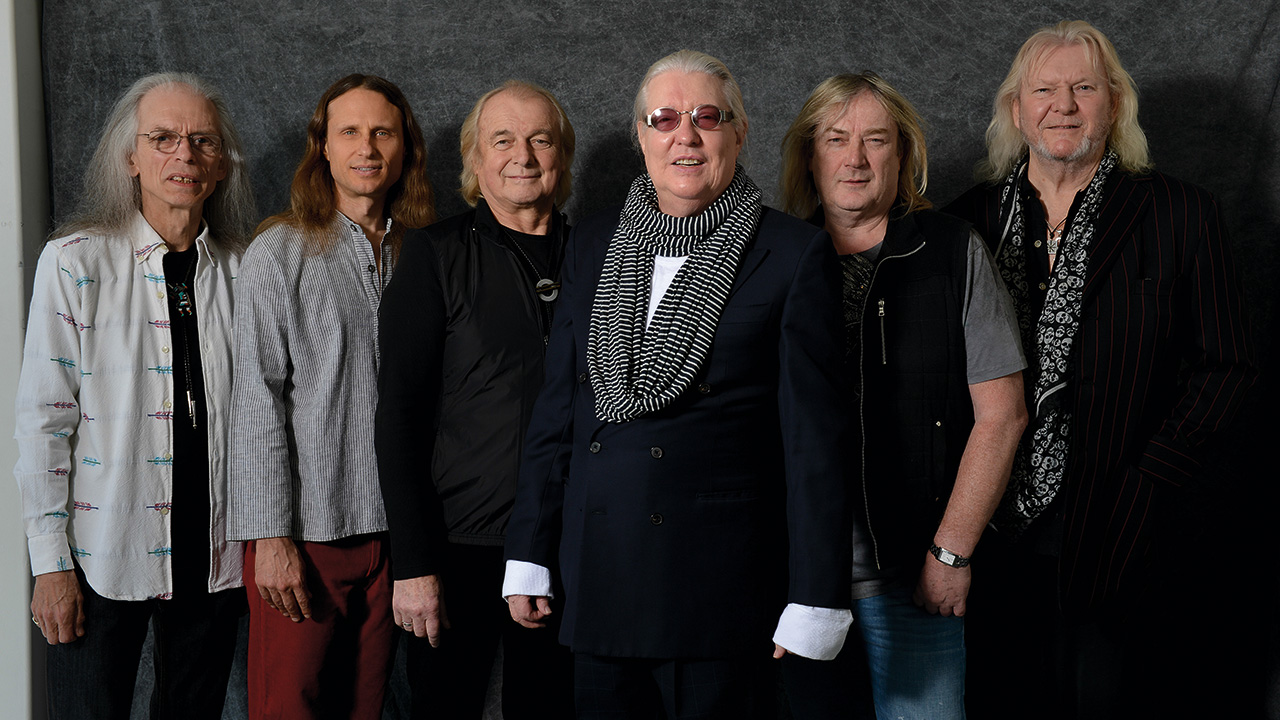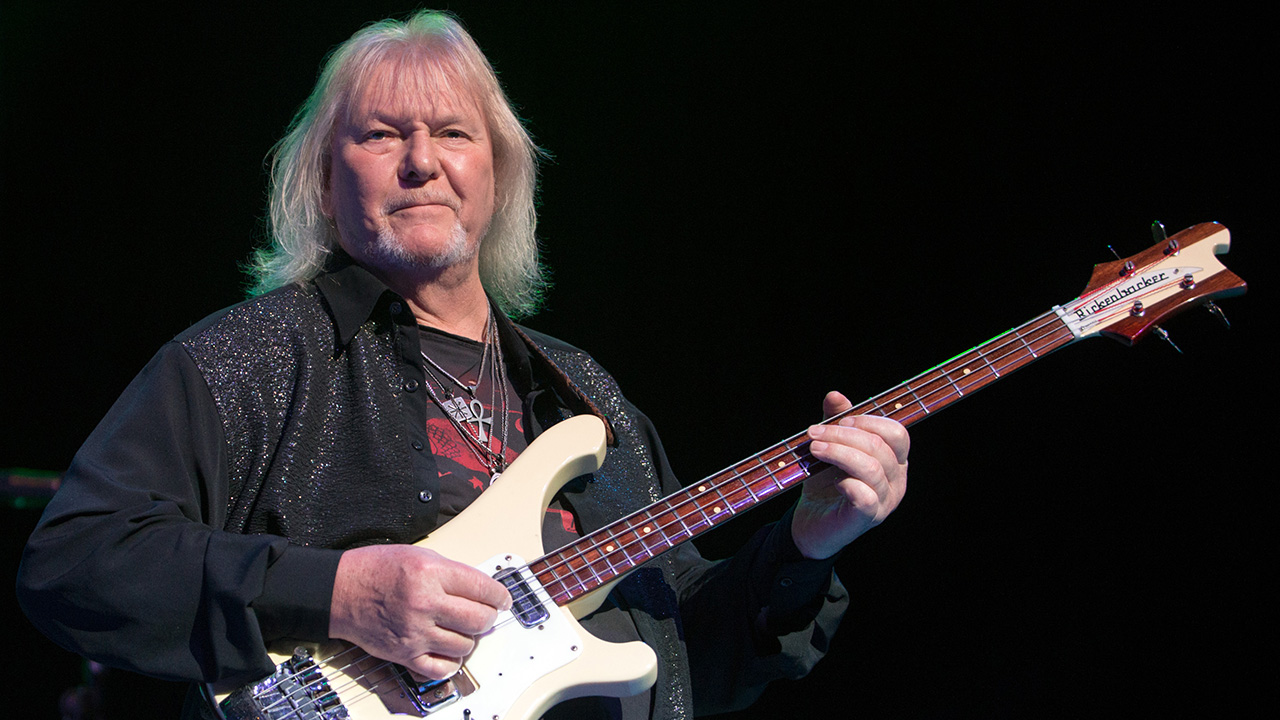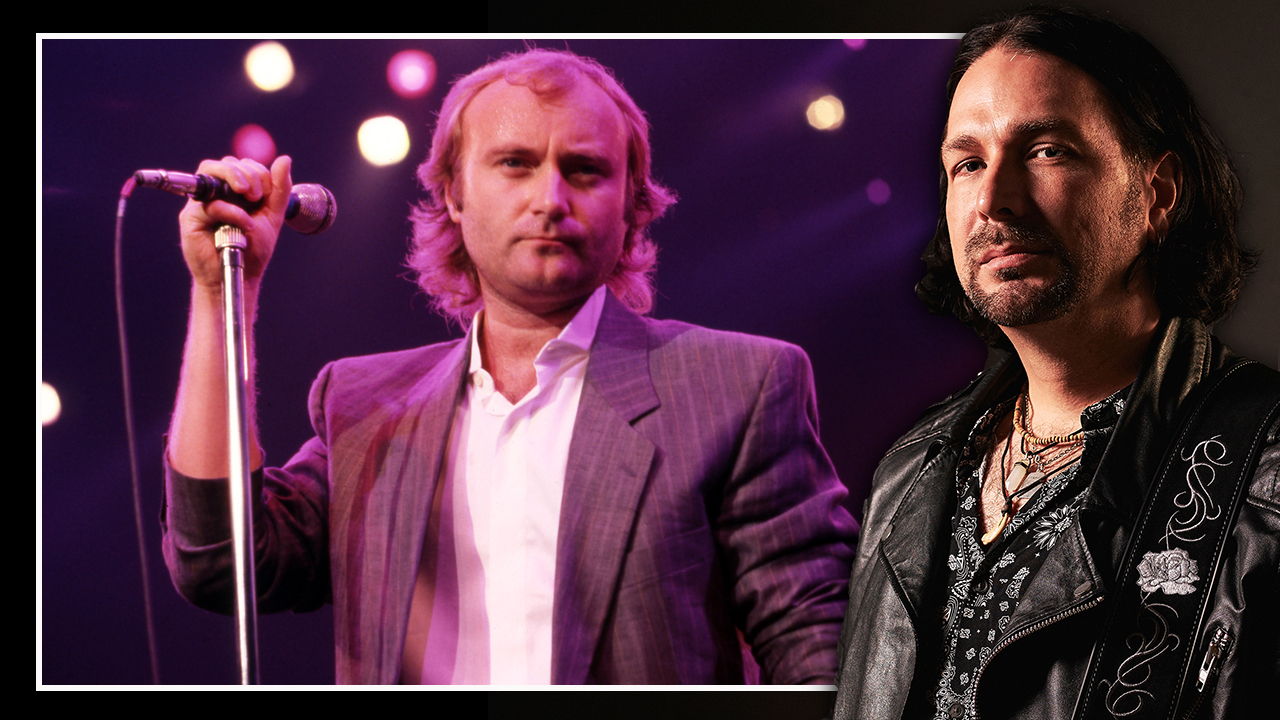“A leopard doesn’t change its spots. There’s going to be certain levels of diva‑ness. It might be nice if there wasn’t, but there is”: Why Yes decided, after some doubts, to make Heaven & Earth
Their first with Jon Davison, and their last with Chris Squire, the 2014 album saw them continuing to release new music after many of their peers had stopped – but didn’t meet the standards expected of it

Select the newsletters you’d like to receive. Then, add your email to sign up.
You are now subscribed
Your newsletter sign-up was successful
Want to add more newsletters?

Every Friday
Louder
Louder’s weekly newsletter is jam-packed with the team’s personal highlights from the last seven days, including features, breaking news, reviews and tons of juicy exclusives from the world of alternative music.

Every Friday
Classic Rock
The Classic Rock newsletter is an essential read for the discerning rock fan. Every week we bring you the news, reviews and the very best features and interviews from our extensive archive. Written by rock fans for rock fans.

Every Friday
Metal Hammer
For the last four decades Metal Hammer has been the world’s greatest metal magazine. Created by metalheads for metalheads, ‘Hammer takes you behind the scenes, closer to the action, and nearer to the bands that you love the most.

Every Friday
Prog
The Prog newsletter brings you the very best of Prog Magazine and our website, every Friday. We'll deliver you the very latest news from the Prog universe, informative features and archive material from Prog’s impressive vault.
By 2014 Yes had notched up countless line-up changes and famous bust-ups but made it to 45 years as a musical force. Their 21st studio album, Heaven & Earth, was their first with singer Jon Davison, and, sadly, their last with bassist Chris Squire, who died the following year. The godfathers of prog shared the inside story of an album they later generally accepted to be a disappointment, crushed by a lack of time to refine the songs.
"You know what? The first fucking time I heard it in order was yesterday! It sounds good, though.”
It’s a sunny day in Prague, and Prog finds Chris Squire in fine fettle as he discusses the band’s 21st album, Heaven & Earth. The bassist is the first of four Yes members to be interviewed today in the conference room of the city’s Hilton hotel. There are only four of them because Jon Davison has had to bow out, having already spoken to Prog earlier in the week on the phone; and besides, he needs to rest his voice ahead of tonight’s show as he’s still in the throes of a throat infection.
Squire has only just been sent the finished version of Heaven & Earth – with production by Roy Thomas Baker, and the final mix by Billy Sherwood – and the results, as he says, are none too shabby. A big bear of a man, all long white hair and black tracksuit bottoms with matching T-shirt, he’s in a relaxed mood, ordering a glass of wine even though it’s only lunchtime, and despite the small matter of the three-hour, three-album concert – Close To The Edge, Going For The One and The Yes Album in their entirety, plus an encore of the deathlessly brilliant Roundabout – to negotiate later this evening. “Well,” Squire says of starting rather early on the Pinot Noir, “we are on the continent.”
The bassist happily acknowledges the early online reactions to Heaven & Earth, even though they have been somewhat mixed. “People all over the world are responding to it,” he says. “Some don’t like it and some love it.”
The problem, as he sees it, is that they’re listening to an “un-de-popped” version of the album. “It’s something to do with digital noises,” he sort of explains. On a broader level, does he agree it’s hard to satisfy all Yes fans, with their various appetites for multipartite song suites and more concise material? “This album’s got a bit of both,” he points out. “There are a couple of longer, more complex tracks, and there are a few that are relatively simple and song-y. It’s a good blend.”
Producer Baker has described it as a tour of the band’s styles – the best of Yes, as it were. “That’s nice of him,” Squire says, before admitting that Heaven & Earth almost didn’t happen at all. “I won’t say from which area, but there was some dissent about whether we should make an album at all because nobody makes any money out of them any more, and the last one, Fly From Here, ended up costing us,” he reveals. “So we were definitely a bit more cautious this time.”
Sign up below to get the latest from Prog, plus exclusive special offers, direct to your inbox!
Still, it was important for Yes to maintain their credentials as the last prog band out there refusing to rest on their back catalogue, despite sales figures in these tough economic times for the long-playing record. That was especially the case now they have new frontman Davison on board; a musician with songwriting chops.
“It was important to do an album with Jon,” Squire declares. “He’s been with us a couple of years and he’s a creative person in his own right: a tunesmith and lyricist-musician. That’s why we were convinced we should do it, to give Yes another turn of the cog. Whenever someone came in [to the band] in the 80s, they’d turn the cog and it’d be like, ‘Ah, yes, I like this!’ We’re hoping for the same reaction.”
Considering the turnover over the years, but with the brand as strong as ever, Prog wonders whether Yes are more corporation than band? Squire laughs the laugh of someone who has seen many ‘staff’ members come and go but has remained on the board from the start.
“Obviously it’s the sum of whoever’s in it and of course I’ve been there the whole time, which makes me a lucky man because I’ve had the benefit of working with a lot of different people with a lot of different ideas,” he says.
Does he see himself as the CEO of the band? “Not really,” he replies. “I’m there by default rather than design. And let’s not forget that Alan has been there since ’72, which is quite a while.” At 64, Alan White is the oldest new boy on the block. He’s also the oldest Alan White in rock – the other one, the former sticksman with Oasis, is 23 years his junior, although the latter is arguably worse behaved.
“There was a two-page spread in The Mirror about throwing TV sets out of hotel windows,” recalls White Senior in his strong north-east accent, “and my mother called and said, ‘Alan, I didn’t think you did that.’ I said, ‘It wasn’t me, Mother!’”
We’ve achieved some level of perfection. Will I be playing it in five years? It’s hard to say
Steve Howe
Not that he’s led a sheltered existence: as a member of the Plastic Ono Band and a mate of Keith Moon, he’s been there, done that. When he joined Yes, he found them “pretty strait-laced,” although he qualifies his assessment by adding: “You couldn’t play the music otherwise. It was very demanding and you had to be right on the button. Jon Anderson was leading the troops at that time. It wasn’t like a monastery, but when you turned up for rehearsals, you had to be pretty together.”
The last time Yes went into a studio with Baker, it was in Paris in 1979. The sessions weren’t the most fruitful. One trip to the roller disco with Richard Branson later – true story – Rick Wakeman an Anderson ended up leaving the band, to be replaced by Trevor Horn and Geoff Downes.
Many of White’s memories of that period involve “everyone driving around in their own cars and eating in really good restaurants.” The Heaven & Earth recordings in Los Angeles earlier this year were, by contrast, more productive: “More detailed and controlled,” White pinpoints. “We all turned up every day at a certain time.” He’s delighted with the way the new album has turned out too. “It’s different from anything we’ve ever done – but then all Yes albums are slightly different from the last one,” explains the drummer, who co-wrote the track To Ascend with Davison.

He agrees with Squire that it offers a compromise between “songful” Yes and “the intricate playing that we’re famous for.” The most rhythmically taxing track is the closer, Subway Walls. What is it, 17/4? “It’s actually 17/8,” he corrects with a laugh. “Yes are pretty meticulous in the studio; we like to get things right.”
Steve Howe is the member who most resembles a rock musician, if not a rock star. Gaunt, with a wild shock of silver hair, he’s dressed quite flamboyantly and has the intensity of someone accustomed to an atmosphere of hothouse creativity. He sounds cautiously satisfied with Heaven & Earth. “It’s too soon to say, really,” he says. “We’ve achieved some level of perfection. Will I be playing it in five years? It’s hard to say.”
Prog suggests that Yes are one of those rock mainstays – like the Rolling Stones and David Bowie – who, whenever they release a new record, they get the “it’s the best thing they’ve done since…” treatment. In Yes’ case, that “since” is usually followed by Going For The One, and occasionally (as was the case in some quarters with Fly From Here) by Close To The Edge. “That’s the challenge,” agrees Howe. “Yes fans have a lot of records by us that they love.”
That was always the goal of Yes: to be the most perfect we could be, with great harmonies, the best instrumentation and great arrangements
Steve Howe
Despite his serious professorial air, the guitarist has retained his youthful vigour. He starts talking about “rock’n’roll vices” and “exotic highs,” raising the question: when did Yes last indulge? “I’m not going to tell you!” he laughs, then pauses to reflect on the band’s twin reputations for austerity and gravity. “I mean, it’s a rock’n’roll band fundamentally. Sometimes when I introduce Going For The One onstage, I mention that our roots are in rock’n’roll. It would be silly to think we’re all like priests and never have a laugh about anything. But then, as Chrissie Hynde said recently, substance abuse is the most destructive thing of all.”
He argues that for all the culture’s synonymity with degeneracy, any rock’n’roll worth its salt is the result of total focus and commitment. “You have to be absolutely clear, and then you can contribute your best. It’s not all about the spotlight and the drama and the fuss. It’s about some guys playing together – that’s sometimes forgotten.
“When you’re younger, you can stay up all night,” he continues. “Do that when you’re older and you feel like shit! Like I say, we’re not priests; we are a rock’n’roll band – we do have an element of tolerance. But you can also have people in the band who lose the plot and that’s what we don’t like. That can be a major fuck-up because the repercussions are like an earthquake. They can break things apart.”
Speaking of losing the plot, have the band members’ tendencies towards the diva‑ish been curtailed since those 1979 Paris sessions? “No, I wouldn’t say that,” Howe smiles broadly. “A leopard doesn’t change its spots. So there’s going to be some repetition of certain levels of diva‑ness. It might be nice if there wasn’t, but there is.”
Does he agree with Squire and White – and Baker – that Heaven & Earth is a kind of compendium of Yes highlights? “I never would have thought of that, but yes, you could say that,” he concedes. “There are songs, but also things for guys who like the instrumentation. That was always the goal of Yes: to be, within one band, the most perfect we could be, with great harmonies, the best instrumentation and great arrangements. But the songs aren’t about one thing. The songwriters collaborate to put things together.”
On the subject of the division of labour, Squire explains that Davison came to his house in Phoenix, Arizona towards the end of 2012 to work on new material. After completing a couple of songs, the singer flew to Seattle to write with White, and then to England for collaborations with Howe and, in Wales, Downes.
It was like, ‘We’ve got so much to finish!’ We had to up our game. But it was a kind of fun pressure, not a nasty pressure
Chris Squire
“I thought that was a good way to approach the album,” says Squire, “because we were maximising Jon as the fresh element, allowing him to interact with each of us. Then we came together at rehearsals and started playing on the tracks we’d each been working on with him.” Davison handled the lion’s share of the lyrics; asked whether he noticed any similarities between Jon Anderson and Jon Davison in terms of working methods, Squire simply says, “Yes – some,” but doesn’t expand further.
However, he does say it was good to go back in the studio with Baker, completing what hadn’t really begun 35 years before. “Unfinished business, yeah,” he grins. “That could have been the album title, but how boring is that? It was nice working with him. He seemed like he knew what he was doing. But then he’s a bass and drums guy, so I had no worries there. He’d play the bass and drums so loud, other people would leave the room!”
So it was a completely different atmosphere compared to 1979? “It was and it wasn’t,” Squire says. This time, the pressures were different: they started the album in January 2014 and it had to be completed by March so they could fulfil tour commitments in Canada.

“Towards the end it was like, ‘Oh fuck, we’ve got so much to finish!’ We had to up our game at that point. But it was a kind of fun pressure, not a nasty pressure. Everyone rose to the occasion.”
They were too busy, it’s said, to finish a typically Yes-style epic multi-part song suite that Prog has heard about on the Yes grapevine. However, none of the band can remember working on it. Squire and White draw blanks. Howe even seems mildly affronted: “I don’t know how a story like that can come about – if it had been recorded, it would have weighed in like a submarine,” he says, bemused. “I think it’s a valueless comment.”
However, Downes does seem to remember working on the piece. “We started it in a studio in Phoenix with Chris and Alan – we spent time jamming it and I compiled various sections. Then when Jon came to Wales where I live, we worked on it some more. We worked on two pieces, actually; one of which is on the album – Subway Walls – and another that isn’t. It’s about 15 minutes long, but we just didn’t have time to put it together for the record.
If I see a decline, I hope I’ll have the wisdom to leave on a high. You should always see a greater possibility for yourself
Steve Howe
“It doesn’t have a title, but it’s a big piece,” he adds. “It comprises about seven or eight different styles of music and is extremely progressive. It has the potential to be a Close To The Edge style track in terms of landscape and duration, or a Fly From Here. I’ve got the original demo and I hope to develop it at some point.”
Downes, the newest member prior to Davison’s arrival, is uniquely placed to have a detached view of the band. He first saw them live, aged 19, at Manchester’s Free Trade Hall in 1971, just after Wakeman had joined from Strawbs. He never dreamt that within nine years he’d be onstage with them, at Toronto’s Maple Leaf Gardens.
“That was my first show with them,” he marvels, still sounding amazed today. “It was a revelation.” A fan of football analogies, he likens his joining Yes to David Beckham playing for his childhood favourites Manchester United, while he describes himself as Yes’ sweeper. “The sweeper is the distributor of the ball for the other guy to put in the net,” he explains.
How does he differ from his keyboardist predecessors? “Tony Kaye was more of a roots man with his Hammond and piano,” he considers. “Rick took it further and was very much a flamboyant soloist. Patrick Moraz was also flamboyant. I see myself more as a lynchpin and an orchestrator.” As he sees it, Yes are still in music’s Premier League. He considers Heaven & Earth to be “a departure from anything Yes have done before,” noting its “immediately melodic” qualities.
Squire scoffs at the idea that the band checked out the competition beforehand. “Nah,” he says. “We’ve never done that. We just put our heads down and become Yes. It’s just a combination of what we all do individually.”
We’re the last boys standing in many respects, which is great. It really is a remarkable catalogue of music
Geoff Downes
Howe is determined to quit at the top and is confident there’s plenty of music in him yet. “If I see a decline, I hope I’ll have the wisdom to leave on a high. You should always see a greater possibility for yourself, as opposed to a sliding scale downwards.” Unlike Squire, he’s all about embracing new artists. “It’s about determination, having a life you value, one that plays into your music, and curiosity. I’ve never stopped noticing new guitarists, writers and singers. That fuels my excitement.”
White is just delighted to have found himself “singing the songs from the album every morning;” and as for Downes, he sees Yes as a team like no other. After all, who else from the original prog era issuing new albums, with a continuing expectation from fans that they produce work to condend with their very best?
“We’re the last boys standing in many respects, which is great,” he says. “It really is a remarkable catalogue of music. Close To The Edge, Going For The One and The Yes Album are just scratching the surface. There’s the 80s period of Trevor Horn, Drama, 90125 and Big Generator… For a band to go through so many inceptions and still be doing it 45 years later…”
He stops himself, to glory for a moment in the greatness of Yes. “It’s pretty amazing.”
Paul Lester is the editor of Record Collector. He began freelancing for Melody Maker in the late 80s, and was later made Features Editor. He was a member of the team that launched Uncut Magazine, where he became Deputy Editor. In 2006 he went freelance again and has written for The Guardian, The Times, the Sunday Times, the Telegraph, Classic Rock, Q and the Jewish Chronicle. He has also written books on Oasis, Blur, Pulp, Bjork, The Verve, Gang Of Four, Wire, Lady Gaga, Robbie Williams, the Spice Girls, and Pink.
You must confirm your public display name before commenting
Please logout and then login again, you will then be prompted to enter your display name.





